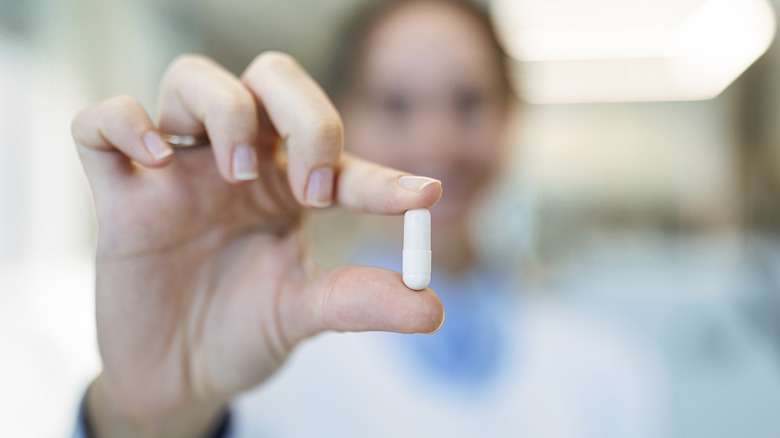What Is The 'Plastic' Coating On Pills Made Of?
Medicine can come in many forms, including pills that look like they're covered with a plastic capsule. In fact, the empty capsule market is so popular that it's expected to reach an annual net worth of more than $5.2 billion by 2030, according to a 2022 study in Polymers. That said, those hard-shelled capsules only look like plastic; they aren't actually created from plastic. This is good news because microplastics don't belong in your body. As a 2023 review from Yonsei Medical Journal noted, microplastics can have a toxic effect on respiratory and other systems.
Yet despite not being plastic, traditional hard-shelled capsules may still be controversial, particularly for people who are following a specific type of diet. So, why have hard-shelled capsules been common for millennia (yes, even the ancient Egyptian people used them)? For one, hard-shelled capsules have little (if any) flavor, making them exceptional carriers for medications that might not taste great or even pleasant. Moreover, they allow the capsule to get into the stomach or intestine before the medication is released, potentially improving the drug's bioavailability.
These benefits are possible because hard-shelled capsules act like watertight containers. Once filled, they protect the dry medication inside. The coating that makes up those hard, clear capsule shells is conventionally made from hardened gelatin. That's where coated pills get a little more controversial than you might expect.
Unexpected origins of a proven drug delivery system
The gelatin that makes up standard hard-shelled capsules typically is produced from processing livestock byproducts that aren't usually sold and eaten in grocery stores, such as bones, connective tissues, and skin. Vegetarians and vegans can be opposed to consuming any hard-shelled capsules that come from animal gelatin sources; as a result, they sometimes turn to tablets versus capsules. However, they're being presented with more options than ever that line up with their preferred animal-cruelty-free lifestyles. (Here are some foods you probably thought were vegan, but actually aren't.)
As a response to consumer demand — and a general societal rise in the practice of vegetarianism and veganism — some drug makers have begun offering hard-shelled pills made from vegetable-based gelatin substitutes. Vegan hard-shelled capsules use a combination of water and hydroxypropylmethylcellulose (HPMC) or pullulan to replicate a conventional capsule coating. Though they're more expensive to mass produce than their animal-based counterparts, they can be just as effective. Plant-based capsules allow pills to be swallowed and dissolve reliably in the stomach just like any other capsule, so if you opt for vegan-friendly hard-shelled capsules, you aren't losing any of the basic effects of a regular capsule.
Allergic reactions to traditional capsule coatings
Even if you haven't adopted a vegan lifestyle (or are a beginner to the vegetarian diet), you may still prefer plant-based capsules if animal-based gelatin ones cause you problems. Some people experience gastrointestinal problems when they consume hard-shelled pills made from traditional gelatin.
Indeed, allergic responses to gelatin seem to be getting more clinical investigation. For instance, the subject was explored in depth in a 2009 article in the Journal of Allergy and Clinical Immunology. The authors hypothesized that allergies and sensitivities to gelatin made from beef or pork might be more widespread than experts initially realized.
Accordingly, if you're someone who finds that eating pork or beef causes you physical discomfort, you may be at risk of reacting to the gelatin in some hard-shelled capsules. If you have any doubts about taking an animal-based gelatin capsule, you can always look for non-animal capsule alternatives or ask a medical professional if it's possible to get your prescription medications in another form.


